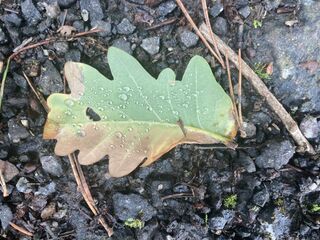Anxiety
How Ecotherapy Can Soothe Climate Change Anxiety
Eco-anxiety is a growing mental health issue.
Posted August 10, 2022 Reviewed by Tyler Woods
Key points
- Climate change is impacting the mental and psychological health of a growing number of people.
- Eco-anxiety and climate-related psychological conditions impact young people significantly more than the older generations.
- Ecotherapy and nature connection activities can help people to manage climate and ecological psychological disorders and conditions.

Terms like "ecological grief," "eco-anxiety," "climate anxiety," and "nature deficit disorder" have not been recognized by many medical professionals and health services as diagnosable conditions, however, their prevalence is on the rise and their psychological and emotional impact is becoming increasingly difficult to ignore (Albrecht, 2019 Louv, 2005). Eco-anxiety and climate-related problems are likely to become more pressing and significant public health issues around the world as deaths and illnesses relating to the climate crisis occur more and more. In 2018, a report found that one-fifth of all premature deaths were attributable to the climate crisis, and a Canadian doctor diagnosed a patient with 'climate change' in 2021. While anybody can experience distress or discomfort as a result of climate and ecological concerns, it is children and young people who are most at risk of suffering from these mental health problems (Gregory, 2021).
Health and wellbeing are often measured in relation to whether a person can function and have a meaningful and independent life. The ability to function is a prerequisite for thriving in our lives and most therapeutic interventions are designed to treat or manage mild to moderate distress or discomfort where the aim is to help the client to function better and hopefully enable them to thrive and reach their full potential. For people to thrive, the environment and the conditions must be agreeable as possible. The elephant in the room for me, as an ecotherapist and an academic researcher, is that climate change and environmental concerns are increasingly impacting the lives of clients and the wider global population, recent extreme weather events being just one example of this.
My children and my clients have spoken to me about their fears on this issue, and I am keenly aware that these fears are not unfounded, irrational, or unhealthy. They are rooted in science, empirical observations, and decades of ecological neglect. Recent studies show that increasing numbers of our young people are scared for the future and are experiencing mental illness and distress because of the climate crisis (Deachman, 2022, Gregory, 2021).
As a therapist, I see my role as helping people to remain healthy and find contentment and peace in their lives through traumatic and difficult periods and experiences. I work primarily with neurodivergent people, and many of my clients are highly sensitive, intelligent, and creative people, often keenly aware of their environment and changes within their surroundings, including temperature changes and ecosystem alterations. It is difficult to find peace and contentment in the middle of the numerous global disasters and tragedies that appear to unfold daily.
It may be difficult, but it is important for people to prioritise their health and wellness at this time by engaging in ecotherapeutic practices and nature connection activities for health purposes. These experiences can enhance our health and lead to affirmative and meaningful environmental actions that help to protect and preserve our natural spaces and crucial life-sustaining ecosystems (Martin et al., 2020).
Joanna Macy is an ecophilosopher and Buddhist scholar who is widely cited and respected within environmental circles for her work on staying well in a time of ecological uncertainty and precarity. One of Macy's more popular works was the book Active Hope, which she co-authored with Chris Johnstone. This book gives clear guidance and support on how to honor the mess we are in and find ways to process the emotions that can accompany learning and reading about the planetary situation we face. It talks about how people can come together to change the ecological narrative and trajectory of climate change by consciousness-shifting activities and developing and maintaining alternative life-sustaining practices and systems (Macy & Johnstone, 2012).
I often talk to my clients about the "sweet spot" in terms of mental health and wellness, particularly when trying to come to terms with difficult and painful circumstances and experiences. The sweet spot is the place where we are aware of the situation and the impact that it has had but are able to accept what has happened and how things stand in the present moment. This may appear to be oxymoronic and slightly ridiculous when thinking of global and environmental crises, but it's how good mental health and wellness are best maintained.
Total acceptance is not an excuse for apathy or negligence, but it is a useful tool for staying well through problematic and often worrying times in our lives. In other words, how can we say to ourselves, "We are where we are... Now, what can I do to make it better for me and the planet?"
Many people see climate breakdown and environmental issues as a tragic and traumatic threat to life as we know it. These anxieties and conditions should be seen as ecological stress responses that have manifested because people want to live good, healthy, and fulfilled lives in an environment that appears to be becoming more hostile and problematic. These developments are something that therapists and mental health practitioners should be paying attention to, as these events impact individual and collective health. Ecotherapy helps people to understand that we are a part of nature and by connecting more deeply and fully with the natural world and the cycles that we live by, we can face almost any tragedy and overcome almost any problem.
References
Albrecht, G. (2019). Earth Emotions: New Words for a New World. Cornell University Press.
Deachman, B. (2022). Eco-anxiety is rising as extreme weather becomes commonplace. There is no easy fix. Mid-West Monitor- date accessed 04/08/2022.
Gregory, A. (2021). 'Eco-anxiety': Fear of environmental doom weighs on young people. Th Guardian website- date accessed 04/08/2022.
Louv, R. (2008). Last Child in the Woods: Saving Our Children from Nature-Deficit Disorder. Algonquin books.
Macy, J., & Johnstone, C. (2012). Active hope: How to face the mess we're in without going crazy. New World Library.
Martin, L., White, M. P., Hunt, A., Richardson, M., Pahl, S., & Burt, J. (2020). Nature contact, nature connectedness and associations with health, wellbeing and pro-environmental behaviours. Journal of Environmental Psychology, 68, 101389.


